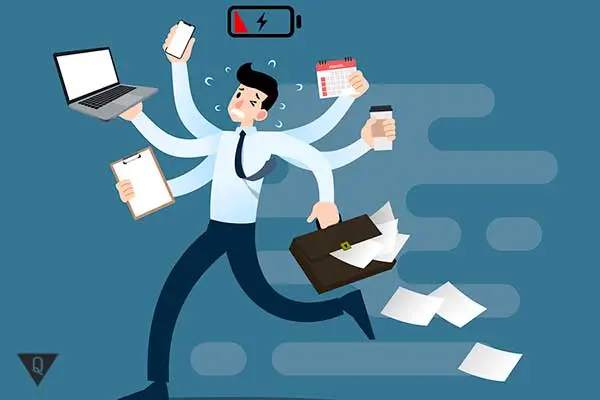Contents
Hello dear readers! We have already talked with you about the problem of depletion of strength and energy, loss of motivation. Today I want to touch on such an important topic as professional burnout syndrome.
What it is?
Professional burnout syndrome is a gradual fading of the desire to work, communicate with the manager and colleagues. It has consequences such as depression and the development of somatic diseases.
Based on the research of the American psychiatrist Herbert Freudenberger, this condition is caused by physical and emotional exhaustion due to the end of a person’s internal resources in the process of professional activity.
Basically, this syndrome affects specialists who work with people — doctors, teachers, coaches. But burnout is also possible for those who do not work — students, housewives. In this article, I will talk about the problem in terms of burnout at work, but you can also draw a parallel to other aspects of life.
Symptoms

You can recognize the syndrome of professional burnout by the characteristic symptoms. Such a person:
- Indifferent, emotionally exhausted. He reduces the severity of experiences in all spheres of life — work, hobbies, communication with friends and colleagues.
- Dehumanization is manifested — negative emotions in relation to those people with whom one has to communicate during the performance of one’s professional duties. Moreover, some anger can cause emotional outbursts.
- Experiencing a sense of inferiority or incompetence in work matters. As a rule, these are unsupported feelings. But, as a result, he is not confident in his skill, so he cannot be tuned in to a positive result. There is a reduction in achievements in professional terms.
If you notice one or more of the above symptoms in yourself, this is a reason to believe that the burnout mechanism is already running. It depends on your further actions whether this process will stop or will continue to worsen.
To accurately determine your condition, I recommend taking this test.
Professional burnout factors
Professional burnout affects both young professionals and those who have already accumulated considerable experience. Rather, it depends on the emotional background, the balance of emotions and the nature of behavior in different situations, especially in critical ones.
Each of these factors individually or a combination of several of them in combination carries a real danger for a specialist accustomed to dedication. It is important that the diagnosis of the state of burnout is timely. This is essential to successfully prevent major depression and other negative consequences.
There are the following factors leading to professional burnout:
High pace of work and ever-increasing demands

The management of some companies cannot be called professional at all. And things like contradictions in strategic and tactical leadership are not uncommon. Naturally, this not only confuses responsible employees, but also exhausts them emotionally. Often they are given excessive demands that do not correspond to their capabilities. And, as a rule, there are no criteria for an objective assessment of the results achieved.
Also, the lack of motivation and stimulation of employees to work can lead to burnout of employees. All this in a complex negatively affects the emotional state of individual employees.
Constantly intense psycho-emotional activity
A person working with people has to constantly reinforce his words with appropriate emotions — actively set tasks and immediately respond to emerging problems, intensively memorize a large amount of information, quickly analyze and make decisions.
An employee outgrows their job
You may notice that there are people who do their work as if in automatic mode, without enthusiasm and due interest. Or vice versa — a person performs routine tasks day after day. But from those tasks that require an irrational approach or cause difficulties, he tries to leave.
Thus, there can be no talk of any professional development. The only adequate way out in such a situation is a frank conversation with the manager in order to redistribute workloads and responsibilities. So you can prevent possible emotional burnout on professional grounds.
Unfavorable team atmosphere
Negative communication between subordinates and the manager, as well as with colleagues. If there is a conflict in the team, one side spends its internal resources, while the other side saves.
The prudent employee is prone to burnout, although he stays as far away from the rest as possible. He saves his nerves and tries not to take what is happening to heart.
The reasons for the emergence of nervous tension among the staff can also be: a change in the organizational structure, the introduction of new technologies, the lack of clear responsibilities and work requirements.
Poor professional motivation

If altruistic emotional return in the performance of duties at work is not evaluated, is not encouraged by bonuses or praise from the management, the employee develops indifference, indifference, and emotional callousness. Naturally, in such a situation it is very easy to burn out emotionally.
Influence of organizational factors
These factors include: the nature of the work performed, the length of the working day, close communication with customers, feedback from management, the presence or absence of independence in decision-making.
Corporate culture of the company
If the competition in relations between team members is high enough, emotional exhaustion will be massive. Managers in this situation experience burnout many times more often than employees. Since they are subject to inflated expectations from higher management. Because of this, constant tension and fear that they will not justify his hopes plays a bad joke on their emotional state.
There is also a discrepancy between the work performed and the sincere desires of the employee. In such a situation, it becomes necessary to determine what is more important: the result or the process? If the process itself does not please the employee, but only cares about the result of the work, burnout in this case is simply inevitable.
How to get rid of professional burnout syndrome?
Obviously, prevention is better than cure in any situation. But if you still failed to protect yourself from emotional burnout at work, you must immediately take certain actions.
It is worth noting that emotional burnout can accumulate over the years and suddenly manifest itself at the most inopportune moment for this. Particularly sensitive people may be threatened with the deformation of psychological models of behavior.
Sound the alarm immediately if you notice symptoms of emotional exhaustion in yourself — indifference, lack of pleasure from work, dissatisfaction with yourself as a specialist. Chances are you’re on the path to professional burnout. Stop, take a deep breath and stop working hard. Read the guidelines below and stick to them strictly.
To get rid of the syndrome of professional burnout and ensure a normal psychological state, use the following tips.
Recommendations

- Walk outdoors for at least an hour or two. Oxygen is essential for all organs of our body.
- Get enough sleep. Good sleep is the key to restoring the body’s strength and energizing for a new working day.
- Be flexible. The world is constantly changing. And you need to be ready for this. Otherwise, only disappointment and discontent will await you.
- Don’t ask too much of yourself. As a rule, initially people set themselves inflated goals, as a result of not achieving them, they become dissatisfied with their own work, feel helpless, etc. Take care of yourself and try not to overload.
- Adjust your schedule. If you feel constantly empty after work, check your schedule. Most likely, you are working hard. In this case, you just need to adjust and adjust your schedule in order to reduce stress in order to reduce emotional stress.
- Constantly engage in physical activity, which not only perfectly regulates the physiological processes in the body, but also the emotional background. Here, both constant morning exercises and periodic visits to fitness, yoga or the pool are equally effective. The main thing is that you enjoy it.
- Work with frequent breaks. Those who know how to be distracted for 5-10 minutes every hour get less tired. And this rule is true for any kind of activity. Try to distract yourself with small breaks as necessary and after two or three days you will notice that you have become less tired.
- Get rid of negative emotions. People who are prone to the accumulation of discontent, resentment, self-pity, anger and anger are more prone to professional burnout. Naturally, you will not be able to completely get rid of these emotions, but you need to learn how to let them go. And then you will understand that it is much easier to live this way.
- Pay attention to things that bring positive emotions. It can be an alternative job, a hobby, a trip to museums and philharmonic societies, shopping. Remember that you need to pamper yourself, because it is precisely positive emotions that make it possible to concentrate on the positive, to prevent psycho-emotional exhaustion.
Conclusion
By the way, if you do not have this syndrome, but you just want to force yourself to work, then I recommend this article.
Let the work bring you only positive emotions. And I say goodbye to you, dear readers. Take care of yourself, take frequent breaks from work, rest as often as possible and restore your strength in a timely manner. Good luck!









